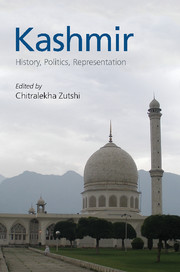Book contents
- Frontmatter
- Dedication
- Contents
- Acknowledgements
- Map 1 Pre-Partition Jammu and Kashmir
- Map 2 Contemporary Kashmir
- Introduction: New Directions in the Study of Kashmir
- PART I HISTORY
- PART II POLITICS
- 5 Azad Kashmir: Integral to India, Integrated into Pakistan, Lacking Integrity as an Autonomous Entity
- 6 ‘Not Part of Kashmir, but of the Kashmir Dispute’: The Political Predicaments of Gilgit-Baltistan
- 7 Law, Gender and Governance in Kashmir
- 8 ‘Survival Is Now Our Politics’: Kashmiri Pandit Community Identity and the Politics of Homeland
- 9 Beyond the ‘Kashmir’ Meta-Narrative: Caste, Identities and the Politics of Conflict in Jammu and Kashmir
- 10 Contested Governance, Competing Nationalisms and Disenchanted Publics: Kashmir beyond Intractability?
- PART III REPRESENTATION
- Contributors
- Index
7 - Law, Gender and Governance in Kashmir
from PART II - POLITICS
Published online by Cambridge University Press: 03 August 2019
- Frontmatter
- Dedication
- Contents
- Acknowledgements
- Map 1 Pre-Partition Jammu and Kashmir
- Map 2 Contemporary Kashmir
- Introduction: New Directions in the Study of Kashmir
- PART I HISTORY
- PART II POLITICS
- 5 Azad Kashmir: Integral to India, Integrated into Pakistan, Lacking Integrity as an Autonomous Entity
- 6 ‘Not Part of Kashmir, but of the Kashmir Dispute’: The Political Predicaments of Gilgit-Baltistan
- 7 Law, Gender and Governance in Kashmir
- 8 ‘Survival Is Now Our Politics’: Kashmiri Pandit Community Identity and the Politics of Homeland
- 9 Beyond the ‘Kashmir’ Meta-Narrative: Caste, Identities and the Politics of Conflict in Jammu and Kashmir
- 10 Contested Governance, Competing Nationalisms and Disenchanted Publics: Kashmir beyond Intractability?
- PART III REPRESENTATION
- Contributors
- Index
Summary
Introduction
It is widely accepted that contemporary conflicts are gendered and that women are subject to gender-specific forms of violence and discrimination. This point is especially salient in light of the United Nations Security Council Resolution 1325 affirming the significance of gender in armed conflict. Gender mainstreaming is regarded as key towards instituting governance reform and enhancing political stability in conflict and post-conflict situations (El Jack, 2003, 3). This particular argument around gender, governance and conflict is premised on redressing gender-blind understandings of conflict and post-conflict reconstruction in states weakened by war – such as in the Balkans, Africa and the Middle-East.
The conflict in Indian-administered Kashmir, however, does not fall within this category. The human tragedy in Kashmir is not the outcome of a weak or disintegrating nation-state. On the contrary, Kashmir has been subject to decades of undemocratic, unrepresentative and authoritarian governance by a relatively stable Indian state that, in turn, generated a militant-led movement for independence in 1989–90. The Kashmiri rebellion against the Indian state prompted a counter-offensive characterized by an extraordinary military mobilization and large-scale human rights abuses by state security personnel against Kashmiri civilians. It also simultaneously served to reinforce the India-Pakistan rivalry over the territory of Kashmir. Both dimensions transformed Kashmir into the most militarized territory in the world (Mathur, 2014; Kashmir Media Service, 2013).
In keeping with the characteristics of contemporary conflicts, the conflict in Kashmir assumed gendered overtones. Yet, as a result of the aforementioned historical and political reasons, Kashmir's gendered realities were shaped by rather different dynamics than the conflicts in Africa or the Middle-East. In contrast to the latter, Indian governance regimes in Kashmir were among the principal sources of the conflict. Accordingly, Kashmiri women were not victims of the social chaos produced by a weak state or failing governmental authority. On the contrary, women in Kashmir faced a formidable and brutal state-led military occupation, an intrusive and predatory state security presence, a pervasive climate of violence, fear and repression, and a culture of public unaccountability and impunity for sexual crimes committed by state security forces.
This particular empirical context within the confines of a ‘democratic’ state mandates a rather different analytic framework. Accordingly, in contrast to approaches focusing exclusively on gender relations in a particular conflict zone, this chapter foregrounds the issue of rape of Kashmiri women by Indian security forces within Kashmir's wider institutional and legislative setting.
- Type
- Chapter
- Information
- KashmirHistory, Politics, Representation, pp. 150 - 171Publisher: Cambridge University PressPrint publication year: 2017
- 1
- Cited by



